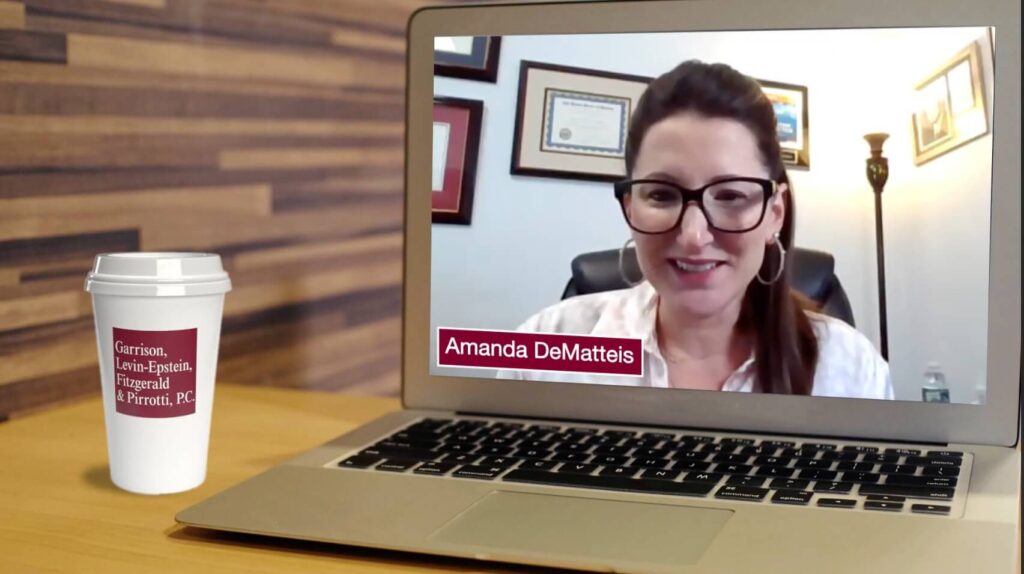Josh Goodbaum: Hi, Amanda!
Amanda DeMatteis: Hi, Josh! What are we going to chat about today?
Goodbaum: I want to talk about a Connecticut employee who has a disability – maybe it’s a physical disability, maybe it’s a mental or psychological disability – and it’s starting to get in the way of their ability to do their job. So, they know they are entitled to a reasonable accommodation; they’ve heard that buzzword ‘reasonable accommodation.’ But they don’t really know what reasonable accommodation means, and they don’t know how to go about asking for a reasonable accommodation.
So, what are the steps a Connecticut employee with a disability should follow in order to request a reasonable accommodation and maximize the chances they’re going to get one?
DeMatteis: Really good question, and this comes up so much, so I’m glad we’re talking about it.
Let’s talk about three really simple steps, okay?
Step Number One: If you need a reasonable accommodation for either a physical disability or a mental disability, you have to ask for it. You need to talk to someone at your employer – maybe that’s HR, maybe it’s your boss – but you need to let them know, “Look, I need something that’s going to allow me to perform the essential functions of my job notwithstanding my disability.” We, of course, would prefer you do that in writing. So, ask for it; put your employer on notice that you need something. That starts and initiates this process.
Maybe an example of what you might need is job restructuring; reassignment or transfer to a vacant position; making the facility that you work in simply more accessible for your physical disability? Don’t forget the mental disabilities, though, that exist. Some folks come to us, and they are really upset, and they have this triggering thing that’s happening to their mental or psychological disability because of a work environment that their employer is creating. Asking to work in a different environment could be a reasonable accommodation based on what your disability is. So, if you’re being bullied, if you think there’s a hostile work environment, if there are behaviors that your coworkers are exhibiting at work that are changing or impacting your mental disability, you may want to request a reasonable accommodation.
So, don’t only think about it as ‘Oh, I’m on crutches, I need a change to my facilities,’ or ‘I need easier access to the restroom,’ or ‘Hey, I can’t see my computer screen as easily, I need something to help my vision on my screen or in my work environment.’ It could be more than that. So get creative and remember to think about it. But rule number one: you have to ask.
That brings us right into Step Number Two: You have to talk to your doctor. Whenever you need a reasonable accommodation at work, part of the process will be getting a medical certification or note from your doctor to say, ‘Hey, look, Amanda or Josh needs this accommodation to be able to perform the essential functions of their position.’ So, you need to be able to talk to your doctor and have an open dialogue with him or her about what at work can change to allow you to better do your job and to more comfortably do your job.
Step Number Three: Talk to an employment lawyer. These requests for reasonable accommodations, like so many other things involving employment law, are really fact-specific. So, chat with an employment lawyer about what your disability is, what type of issue you’re having at work that presents this need for a reasonable accommodation, and the best way to go about navigating this while you’re an employee and asking for something that’s really specific and really nuanced under the law.
The accommodation process after you ask for it requires a really in-depth review from your employer. We call it the “interactive process” or “interactive dialogue.” What your employer needs to do is they need to take a look at what the job requirements are, they need to see what type of limitations or performance problems the employee’s disability creates, and they need to identify by working with the Connecticut employee what reasonable accommodations you can reach to allow you to do your job in a way that is most effective but is also not detrimental to your health.
Remember: If your employer just simply says, “No, sorry, I can’t do that” without engaging in this in-depth review, they may not be meeting their requirements under both the Americans with Disabilities Act (ADA), which is our federal law that protects Connecticut and all other employees who need a reasonable accommodation, but also our state-specific law, which is the Connecticut Fair Employment Practices Act (CFEPA).
You have rights. You have options. If you have any questions through that process, you’re always welcome to reach out to us.
But remember step number one, which I really think is the most important: ASK!
Goodbaum: Great advice, Amanda. Thanks so much!
DeMatteis: Take care!

